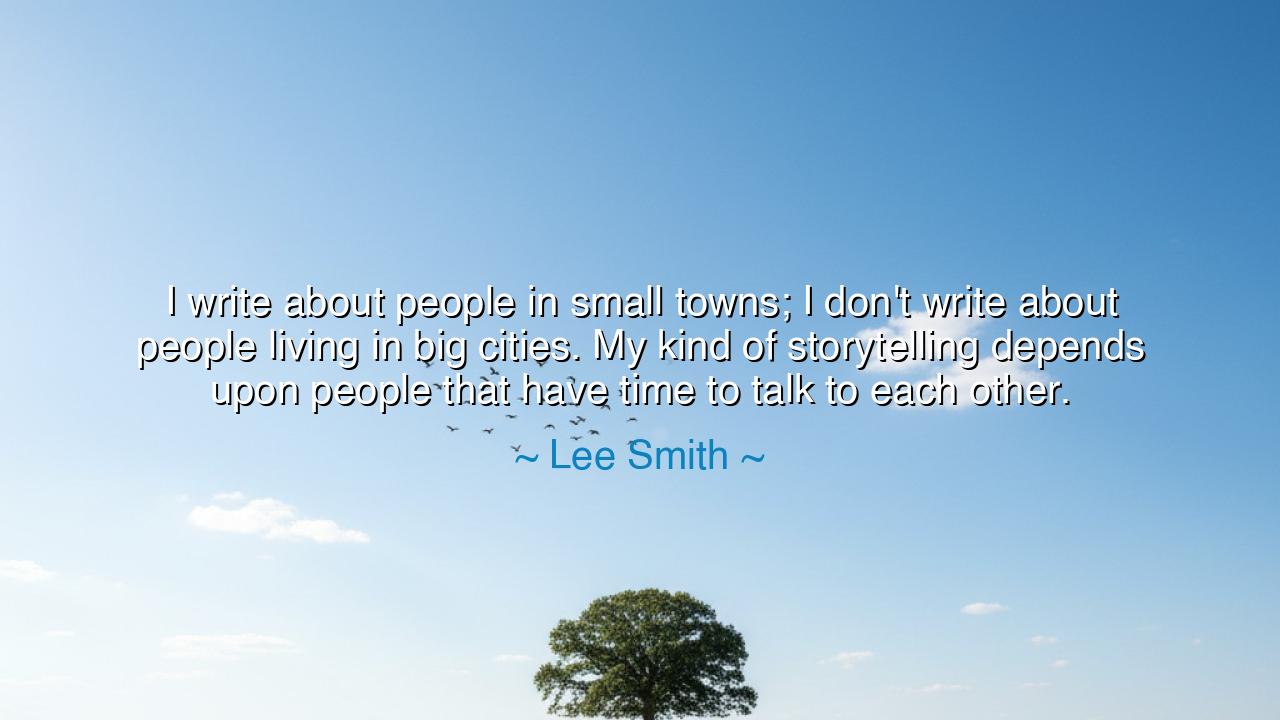
I write about people in small towns; I don't write about people
I write about people in small towns; I don't write about people living in big cities. My kind of storytelling depends upon people that have time to talk to each other.






The author Lee Smith once revealed her heart with these words: “I write about people in small towns; I don’t write about people living in big cities. My kind of storytelling depends upon people that have time to talk to each other.” At first, they seem but a description of subject and craft. Yet, when heard deeply, they resound as an ancient truth about the nature of human connection, about the slow fire of conversation, and about the sacred rhythm of communities where lives intertwine.
The small town is not merely a place of fewer houses and narrower streets. It is a crucible of intimacy, where stories are carried not by parchment but by voices, repeated at porches and store counters, whispered in kitchens, sung in churches. In such places, people know one another’s names, their joys, their griefs, their histories. They carry the weight of memory together. This, Smith tells us, is the soil in which her stories grow. Without this closeness, without this time, storytelling loses its roots and becomes a shadow of itself.
By contrast, the big city, with its towers of glass and its restless crowds, breeds speed and silence. People pass one another without knowing their names. Conversations, if they occur, are fleeting, hurried, pressed by the tyranny of the clock. In such a world, storytelling struggles, for stories require pauses, questions, the patience to listen. To tell a story is to linger, to lean in, to let silence fill the air until meaning takes shape. This cannot flourish in the noise of constant haste.
History bears witness to the power of storytelling born in small communities. Consider the griots of West Africa, keepers of memory and history. They traveled among villages, carrying the tales of ancestors, heroes, and kings. Their voices bound people together, not with written tomes, but with the shared air of conversation. The strength of their culture endured because people had time to talk, time to remember, time to weave identity together. This is the world Lee Smith gestures toward—the world where the story is not merely told but lived.
Her words also remind us that time itself is the lifeblood of storytelling. To share a story is to give part of one’s life to another. It is not rushed but offered as a gift. In small towns, time slows enough for people to notice one another, to ask how the day has been, to sit at dusk on a porch and let memory unfurl. In this space, the story becomes not only art, but healing, belonging, and connection. Without it, the soul grows silent, even amid noise.
The lesson for us is this: no matter where we dwell—city or town, wilderness or suburb—we must choose to reclaim time for one another. We must refuse to let life’s haste rob us of the stories that bind us. For stories do not belong only to writers; they belong to all who listen, all who speak, all who care enough to linger. To live without stories is to live without roots, without memory, without the breath of shared humanity.
Therefore, let your practice be simple yet profound. Create moments each day to ask, to listen, to share. Put down the devices that hurry you, silence the voices that rush you. Walk with someone, sit with someone, let words flow like a river without destination. For in these conversations lies the essence of what Lee Smith teaches: that our humanity is preserved not in grand monuments nor in crowded avenues, but in the sacred simplicity of people who still have time to talk to each other.
Thus her words, though spoken of her craft, are a call to us all. Small towns, time, storytelling, conversation—these are not relics, but treasures to be carried forward. May we guard them, live them, and pass them on, that our lives may never be silent, and that the great story of humanity may continue to be told, one conversation at a time.






AAdministratorAdministrator
Welcome, honored guests. Please leave a comment, we will respond soon